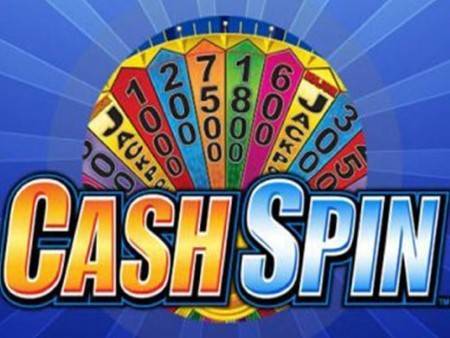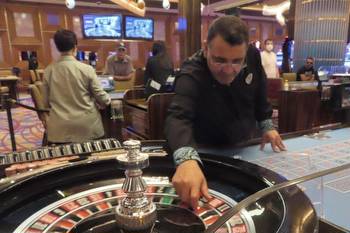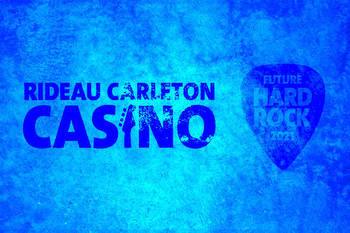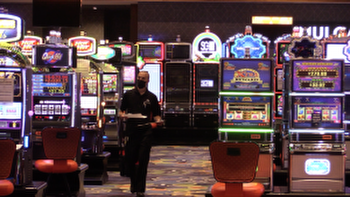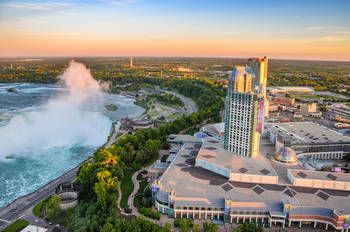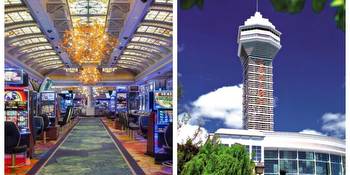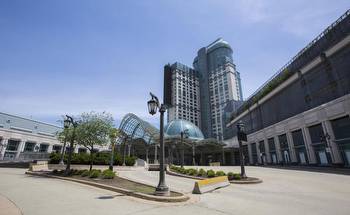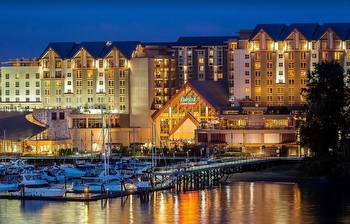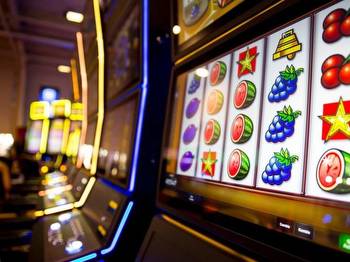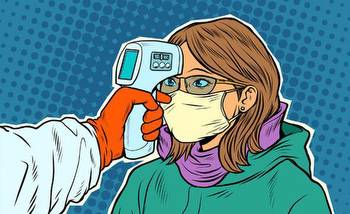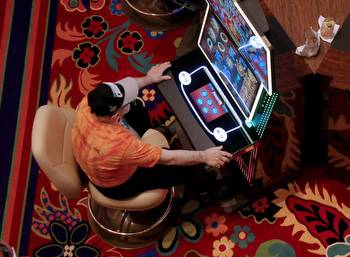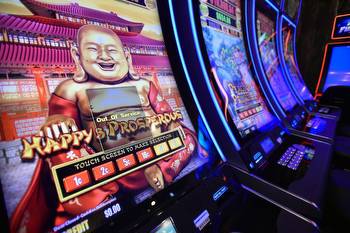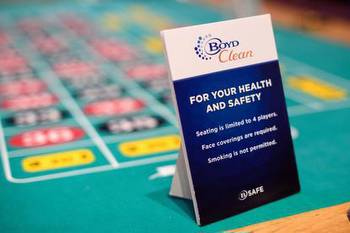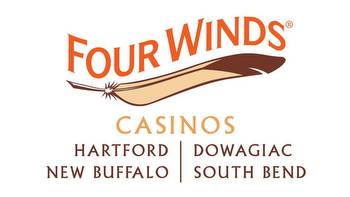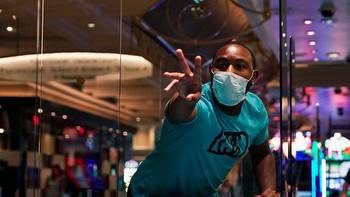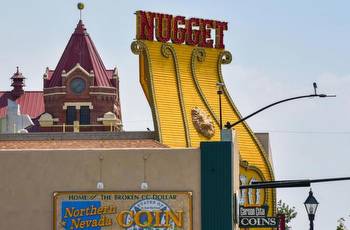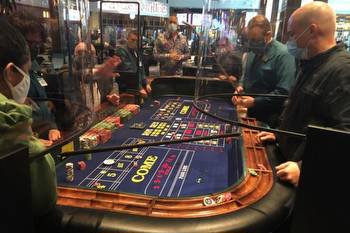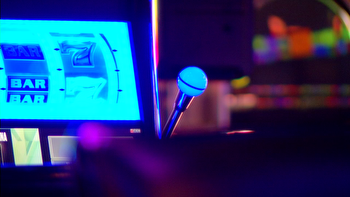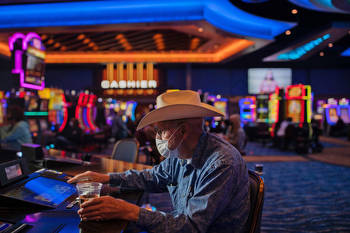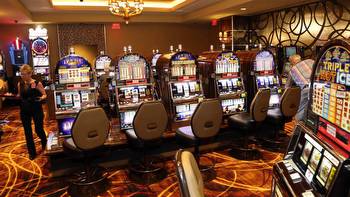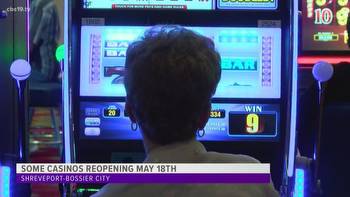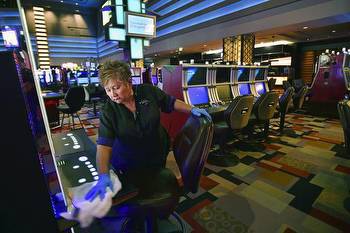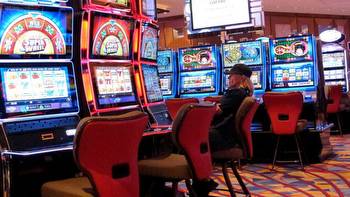How casinos will work when they reopen in a pandemic.
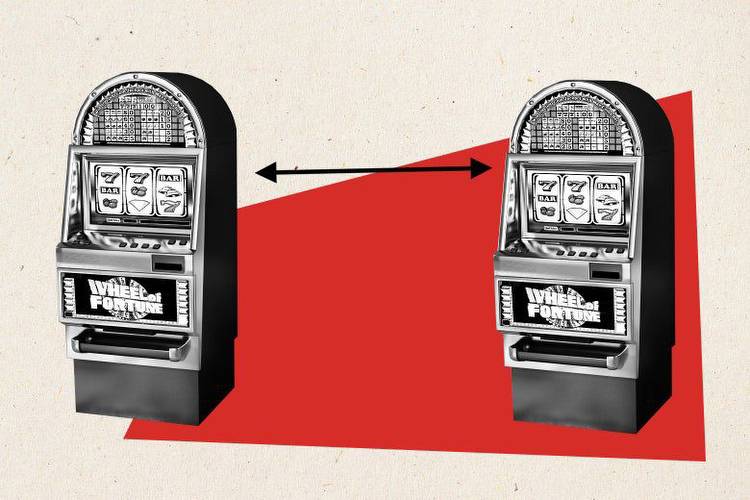
This article is part of Reopenings, a series about how businesses are operating during the pandemic.
You can gamble again in America—at least in the few parts of the country where casinos are cautiously reopening. Casinos in Oklahoma and Montana already have the go-ahead from their state governments to operate, though many are opting to stay closed because of the coronavirus pandemic. Some casinos on tribal lands in Michigan and Idaho have also opened their doors, since they’re only regulated by the federal government and do not have to abide by state-mandated lockdowns.
But casinos in the After Times won’t be the same bustling, hand-contact-heavy places they were. They’ll have fewer games, more protective barriers, and a lot less razzle-dazzle.
Take the Tonkawa Hotel & Casino, operated by the Tonkawa tribe and one of the few casinos in Oklahoma that chose to go back into business when the state’s lockdown on nonessential businesses ended on May 1. (Many tribes have opted to voluntarily follow state lockdowns.) Now the casino is spacing out slot machines, installing hand sanitizer dispensers throughout the property, requiring employees to wear masks and gloves, increasing the frequency of cleanings for cage counters and card tables, and using thermal cameras to check whether people entering are running a temperature above 100 degrees, according to its director of marketing, Billy Burt.
Expect similar protocols as casinos around the country reopen their floors. Executives at the Foxwoods Resort Casino in Mashantucket, Connecticut, have been following the initial openings in developing their own practices for when they eventually begin operations again, whenever that is. “Since we closed on March 17, we have been putting together a reopening plan,” interim CEO Jason Guyot said. “In our 28-year history, Foxwood had never closed its doors, so it’s been a pretty surreal process we’ve been going through.”
When Foxwoods reopens, it won’t offer poker, sports betting, keno, and bingo—partly due to crowding concerns, and partly because the casino won’t be bringing back enough staff at first to man all those games. For games like black jack, players won’t be allowed to touch the cards and decks will be switched out more often, particularly when a new dealer takes over a shift. Foxwoods is strongly considering putting up plastic partitions between slot machines as well as at card tables to separate dealers from gamblers and gamblers from one another. A Las Vegas company called Screaming Images is currently developing recyclable clear acrylic dividers to keep people semi-isolated, which are being tested at the El Cortez casino in the city’s downtown:
Many matters are still up in the air. For instance, it’s unclear when performers can put on shows again, given the crowds they attract. However, Guyot is generally not too concerned about crowding at the property overall, because it spans more than 9 million square feet. Foxwoods managers are still trying to figure out how to clean betting chips. According to Guyot, many cleaning chemicals can cause them to discolor or stick together. And though employees will be sanitizing the chips multiple times throughout the day, it’s still difficult to keep them clean once people start passing them around.
Foxwoods and many other casinos have self-exclusion lists for people with gambling problems who voluntarily ask the establishments to bar them from entry. Given that Foxwoods will require all visitors to wear masks, it may be difficult to identify these people. For now, the plan is to ask people to temporarily remove their masks during the screening process just long enough for a camera to get a good glimpse of their faces.
Like Foxwoods, most major casino chains have yet to set definitive reopening dates, though they have been gradually releasing details about the modifications they’ll be making to their facilities to limit the virus’s spread, partly based on stipulations from local regulators. For instance, the Nevada Gaming Control Board recently released guidelines for how casinos should adjust their business practices. Gambling establishments in Las Vegas and elsewhere in the state will need to devise plans to limit the number of people at card tables, sanitize items more regularly, and ensure that workers and guests are wearing masks. Wynn Resorts has said that it will be removing chairs from table games and has publicly released sanitation procedures for each individual game. The Venetian is using UV lights and electrostatic sprayers to clean its facilities. One Las Vegas casino is even handing out plastic sticks for people to press elevator buttons with, according to the Associated Press. Wynn and some other casinos are hoping to reopen at the end of May. Las Vegas Mayor Carolyn Goodman has repeatedly called for the city to reopen and serve as a testing ground for the rest of the country.
The elderly population, which is a huge demographic for casinos, might not want to riskinfection.
These new regulations are sure to change casinos’ atmosphere and even the dynamics and strategy of some games. For example, craps tables in Nevada will only be allowed to have six players at a time, which probably means that casino floors will be a lot quieter. “Sometimes in a casino you hear all this screaming and yelling because at the craps table you get an excited crowd and somebody gets on a hot roll,” said Steve Bourie, author of the American Casino Guide. “Hard to do that with six people. Normally you’d have 20, 25 people around a hot table.” Bourie also mentioned that it’ll be tougher for card sharks, who usually make money off less-skilled players, to find targets since there will only be four people per poker table in Nevada rather than the usual 10. And he predicts that some casinos may have to raise limits on black jack games because the house won’t be able to make as much money with only three players allowed at each table.
Guyot has put a lot of thought into how these new measures will change the casino-going experience. He worries that it’ll be tough for employees to convey warmth and congeniality given that they have to wear masks and distance themselves from customers. “When you see someone with a mask on, even when you have one on, you’re not as comfortable engaging,” he said. “One of the biggest things from a team-member perspective is that there’s going to be less of that service interaction with a smile.” Foxwoods is working on altering its training program given that employees’ facial expressions won’t be as visible to customers.
When more casinos do get back up and running, Bourie isn’t quite sure just how many people will actually show up. He notes that the elderly population, which is a huge demographic for casinos, might not want to risk infection. “I’m sure a lot of people are going to be scared. It’s a form of entertainment and people develop habits of going to casinos and having fun,” he said. “But their habits have been broken, and they haven’t gone in six weeks or so. So some people may find that they might not want to go so much anymore. They’re scared.” Bourie noted that online gambling has seen a surge in recent weeks, so people may opt to stick with that for the time being.







